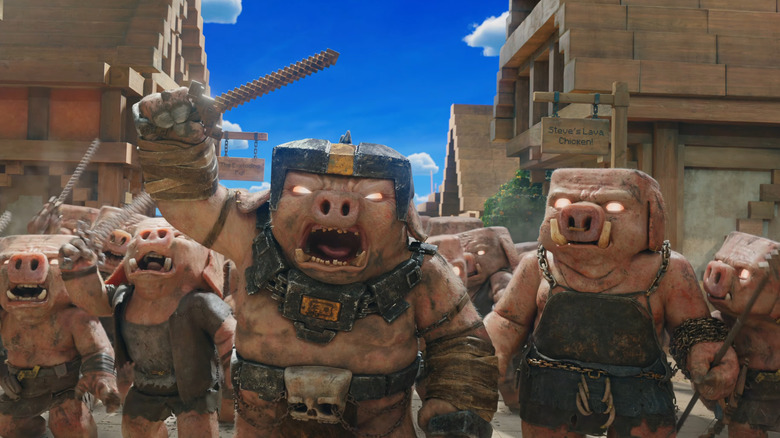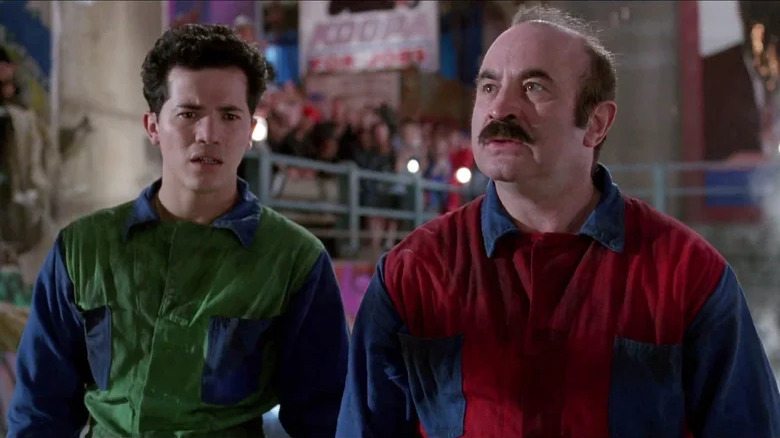The One Thing Video Game Movies And Anime Have In Common (And Why It Needs To End)
The video game adaptation curse may no longer be a thing, but the batting average of adaptations of video games continues to be less than great. While we got the stellar "Fallout" TV series early this year, we also barely got the biggest bomb of the year with the horrendous "Borderlands" movie. That said, we have finally reached a point where video game adaptations are as varied as video game themselves. Shows like "Arcane" and "Cyberpunk Edgerunners" bring their worlds to life with spectacular visuals (telling original and poignant stories that surpass those from their source material), while "The Last of Us" feels instead like a walkthrough video.
Except, there is one thing a shocking number of video game movies have in common, and they share it with anime. When the first "Minecraft" movie trailer dropped, some viewers were surprised to learn the film is about a group of people seemingly being transported into the fantastical setting of the Minecraft game itself. That's right, the "Minecraft" movie is an isekai, which is the most annoyingly popular and prolific anime genre of the last decade.
Isekai, literally "another world," is a genre of fiction wherein a character or group of characters find themselves transported to another world, with the plot usually following their attempt to return to their original world as the characters gain new powers and status in the fantasy world. The origin of the genre can be traced to books like "Alice in Wonderland," "Peter Pan," "The Chronicles of Narnia," and "The Wonderful Wizard of Oz."
In anime, titles like "Inuyasha" and the excellent "Digimon Adventure" in the '90s, and then "Spirited Away" in 2001 started making the genre popular in Japan. It was the 2012 anime adaptation of the 2002 web novel "Sword Art Online," however, that made the genre explode in popularity, inspiring a wave of adaptations of web novels (also called light novels) about characters being transported to a fantasy land (usually through reincarnation after being hit by a truck in the real world). The genre has become so prominent and popular that "isekai" was added to the Oxford English Dictionary in 2024.
The problem with isekai
In the 2020s, there are dozens of new isekai anime being released every season, all with nonsensical and absurdly long titles like "I Got a Cheat Skill in Another World and Became Unrivaled in the Real World, Too" or "The Misfit of Demon King Academy: History's Strongest Demon King Reincarnates and Goes to School with His Descendants." The genre is controversial because it's just so prominent, yet the majority of the stories are essentially the same. It's a formula so established that we've had subversive isekai that break the formula, then isekai that break that subversion and go all the way back to the original formula, resulting in both parodies and parodies of the parodies that end up feeling unimaginative and uninspired.
This brings us back to video game adaptations. Much like the isekai genre has been around for decades and is now dominating the anime medium, the trope of being transported to another world has been the preferred narrative framing for Hollywood adaptations of video game since the very first live-action movie based on a video game — the 1993 "Super Mario Bros." A lot of games that get adaptations, especially in the '90s and '00s, were games without much in terms of story. Add the idea that execs were likely afraid of audiences laughing at the silliness of a video game world, and the idea of being transported to the world of a game and pointing out all the ways things were weird makes some sense.
But by now, it's simply a formula that doesn't usually work out. There are exceptions in both anime and video game adaptations, of course — "Jumanji: Welcome to the Jungle" rules, as do the first two "Tron" movies — but it is mostly just a tired formula that is utterly predictable and lacking the kind of imagination from the games that inspired the movies.
"A Minecraft Movie" is slated to open in theaters on April 4, 2025.

